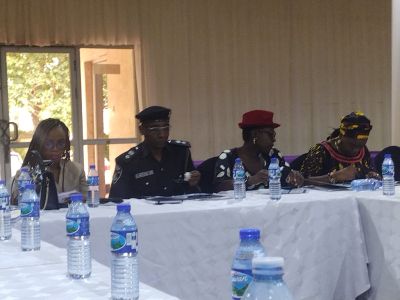Avocats Sans Frontieres (ASF) France has restated the need for digital inclusion and protection in promoting e-rights and press freedom in Nigeria.
Angela Uzoma-Iwuchukwu, the Country Director of ASF France, made the remark on Tuesday at a situation room for authorities, journalists, experts and digital activists held in Abuja.
The News Agency of Nigeria reports that the programme, organised by ASF France, also known as Lawyers Without Borders France, was with the support of the UNESCO global media defence fund.
Uzoma-Iwuchukwu said the intersection of media freedom and digital rights has become a focal point of national discourse.
Also Read:
- How Ibadan student was shot dead by policeman — Government
- Photos: Tinubu returns to Abuja from Pope’s inauguration
- UNIFEMGA commends Oloyede on steps to rectify UTME glitches
- Police rescue five abducted passengers from bandits in Katsina
- Open grazing no more sustainable in Benue – Miyetti Allah
She said the media plays a vital role in holding those in power accountable, providing a voice for the voiceless and fostering informed public discourse,
She, however, expressed concern that journalists often face challenges in carrying out their duties, including harassment, intimidation and violence.
Besides, Uzoma-Iwuchukwu said the digital landscape has also introduced new complexities, with issues like online censorship, surveillance and disinformation which threatened the very fabric of the nation’s democracy.
“Law enforcement agencies, as institutions responsible for maintaining law and order, have a crucial role to play in ensuring that journalists can work safely and freely,” she said.
The country director, therefore, said there is the need to strengthen mechanisms for addressing journalists’ safety and enhance digital literacy and capacity among law enforcement agencies to better understand and address online threats and opportunities.
She also called on the need to develop guidelines for law enforcement agencies to interact with journalists and foster collaboration to promote fact-based reporting, counter misinformation and build public trust.
CSP El-Mustapha Sani, Head of Police Complaints and Response Unit (PCRU), said as part of the effort to enhance police relationship with the media and members of the public, the unit was created in 2015 and codified in the Police Act and Regulation, 2020.
According to him, the office is saddled with the responsibility of receiving complaints from members of the public who have grievances against the police and its officers on acts of misconduct, inactiveness, etc.
He said the unit, which is more digital in nature, is to receive complaints through its platforms like WhatsApp, X, formerly Twitter, Facebook, telephone, etc.
He said members of the public could share information, including videos of their officers’ misconduct on these platforms.
Sani said the establishment of the unit had increased the confidence of members of public in the police and a lot of officers had been dismissed or demoted, while others had been given severe punishment.
He said the unit, which is under the office of the police public relations department in Abuja and 36 states, has helped to strengthen relationship with the media.
Reuben Aguilera, Head of Governance, Security and Migration of European Union Delegation to Nigeria and ECOWAS, said the growth of ICT across the world has led to new opportunities and new challenges
According to him, this has made digital rights a major aspect of our fundamental human rights, highlighting the need to understand what digital rights are and why they need to be protected.
He said current statistics showed that 55.4 percent of Nigerians make use of the internet.
“This accounts for over 120 million Nigerians, most of whom are young people under the age of 35,” he said.
According to him, from project inception to date, ASF France and its partners have been very active in supporting the advancement of digital rights in Nigeria.
“Today’s convening of the situation room, is a key step towards ensuring that the gains made by the project are sustained and advanced.
“The situation room is designed to have stakeholders from state and federal government agencies, experts on digital technology and activists routinely discuss about promoting and protecting digital rights, harnessing opportunities and addressing challenges related to new technologies,” he said.


